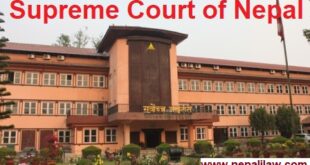Supreme Court established a precedent that only seizure money from the defendant is not sufficient to establish corruption.
In the case of Krishna Prasad Joshi v. Government of Nepal (Nepal Kanoon Patrika, 2077, Vol. 1, DN. 10413), the joint bench comprising Justice Dipak Kumar Karki and Justice Hari Prasad Phuyal of the Supreme Court introduced that principle.
The Supreme Court pointed out that it is an important value of seizure seals in serious crimes such as corruption. Seizure seals (Baramadi Muchulka) are a picture to exactly show the offense-related material (Dashi) evidence where and from whom, how much found.
The SC elaborated that principally, there can be no complete and sufficient basis to establish the alleged guilt just because the money was seized from the defendant. The situation and circumstances of money seizure are also to be considered.
The Compact Disc (CD) submitted by the plaintiff Government of Nepal and even looking at the transcript of it, the money was seized (Baramad) from the defendant and there was a black ink stain on the pocket of the defendant’s shirt and a stitch of the shirt. However, even when the defendant made an immediate statement (Mauka ma Bayan), he is alleged that the video was edited and submitted.
Plaintiff’s witnesses Raj Kishor Sah and Suresh Joshi told the court that the seizure money notes (Baramad Bhayeka note) were crushed.
According to the defendant’s statement, a black ink stain was found on the pocket of his shirt and an open scene on the stitches of his shirt was recorded on CD. In such a situation, it cannot be said that the defendant was not subjected to coercion.
The bench said that the seized money from the defendant cannot be sufficient and sufficient evidence to establish corruption. The fact that the defendant voluntarily demanded the amount and voluntarily took the bribe money should be substantiated by objective, credible, abundant, and sufficient evidence.
The defendants demanded a sum of money from Romahi after observing the ladder of the telephone conversation and the subsequent descent of the prosecution.
Thus, according to Article 25 of the Evidence Act, 2031, there is a legal provision for the prosecution to prove the guilt of the accused in a criminal case.
Therefore the Court observed that it does not appear that the plaintiffs have been able to present objective and credible evidence from the plaintiff side without any doubt that the defendant voluntarily demanded the bribe amount from the service recipient applicant and the accused committed the crime by taking the bribe money voluntarily.
The Supreme Court concluded that in such a case, defendant Krishna Prasad Joshi cannot be found guilty on the basis of conjecture, partiality, and conjecture. According to the universal principle of criminal justice, since the accused gets the benefit of the doubt, the decision of the special court seems reasonable. Thus, Defendant Krishna Prasad Joshi will be acquitted of allegations of bribery and corruption.
 Nepali Law A complete legal information portal
Nepali Law A complete legal information portal

